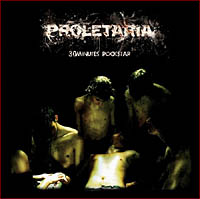PROLETARIA (FRA) - 30 Minutes Rockstar (2011)

Label : M & O Music
Sortie du Scud : 28 mars 2011
Pays : France
Genre : Metal moderne
Type : EP
Playtime : 7 Titres - 30 Mins
Un bref rappel linguistique ne devrait pas être de trop pour rentrer correctement dans cette chronique. Selon le site Larousse.fr, le prolétariat est une « classe sociale constituée par les prolétaires, considérée par les marxistes comme la classe sociale productrice des valeurs, et révolutionnaire à l'époque du mode de production capitaliste ». Production, valeurs, révolutionnaire, voilà un champ lexical assez encourageant qui place d’emblée les parisiens de PROLETARIA sous le joug du dur labeur. Et je ne sais pas si la rousse a écouté 30 Minutes Rockstar, mais elle ne s’est pas trompée sur les mots employés. Car en effet, ce qui ressort de l’écoute de ce deuxième EP, c’est que ce jeune groupe français est productif, valeureux et un peu révolutionnaire il est vrai.
Leur registre musical pourrait se limiter au Metal moderne. Mais on sait tous que cette division contemporaine du Metal veut dire tout et son contraire. Alors pour être plus précis, le Metal sera le style généraliste dans lequel navigue ce disque, fortement appuyé par des piliers constitués de Hardcore, de Post-Hardcore, de Screamo, de Punk et d’un chouïa de Noise. Ce qui frappe d’entrée de jeu, c’est ce grain très brut, très sec qui relègue malgré lui PROLETARIA au rang des formations qui donnent tout sur le fond et très peu sur la forme. Mais ça, c’est mal écouter 30 Minutes Rockstar. Parce qu’au-delà d’un premier abord pince-sans-rire, ce disque se révèle riche, structuré et bien léché. Je dois dire que celui qui fait tout de suite bonne impression, c’est Kevin, leur vocaliste. Ce dernier surfe sans trop de honte sur les tendances actuelles du haut de ses cris perçants, de ses murmures plaintifs, de sa voix claire et fluette qui ne suit d’autre sentiment que ses feelings les plus primaires, pour aboutir en beauté sur un enchevêtrement de n’importe-quoi au cœur de « It’s Gonna Be Legendary ». Soit c’est du culot, soit c’est de l’inconscience. Derrière lui, les guitares sont branchées sur courant alternatif, balançant tantôt des riffs dopés aux amphets et tantôt des dépressurisations un poil plus crabbys. Tout ça sonne évidement très moderne et très trendy mais on n’oublie pas non plus, et il est important de le souligner, que PROLETARIA reste réfléchi à l’endroit même où ils auraient pu sombrer dans le grotesque comme tant d’autres. Ce n’est pas toujours très harmonieux mais en même temps, ces gars n’ont pas cette prétention. Quelques créations se détachent parmi lesquelles « Krieg Krieg Poudja » et ses structures décharnées ou l’instrumentale « London » qui évite le piège de la balade à deux francs en restant bien burnée. Le seul reproche que j’ai à faire, en plus de la production qui pêche en rondeur et en fluidité, c’est que les parisiens la jouent parfois un peu facile et versent des gouttes mortelles de TESS dans le verre de ses auditeurs, comme sur « That’s What I Call » qui étonne par sa trop grande trivialité au milieu de compositions autrement plus convaincantes.
Inutile néanmoins de se faire du mouron pour un groupe dont l’avenir au sein de la scène française semble tout tracé. Ce second essai ne peut avoir d’autres conséquences que d’asseoir encore plus la légitimité de PROLETARIA à ce niveau et tout le monde sait que tirer son épingle du jeu dans ce bourbier n’est pas chose aisée. Les parisiens y parviennent avec une aisance manifeste qui passerait presque pour de l’impudence s’il y avait une moindre chance qu’on réentende parler d’eux à l’avenir. Hélas, je crains que sortir un bon EP ne soit plus un gage suffisant pour miser sur ce type de canasson et c’est bien dommage.
Ajouté : Lundi 13 Février 2012
Chroniqueur : Stef.
Score :    
Lien en relation: Proletaria Website
Hits: 14140
|














